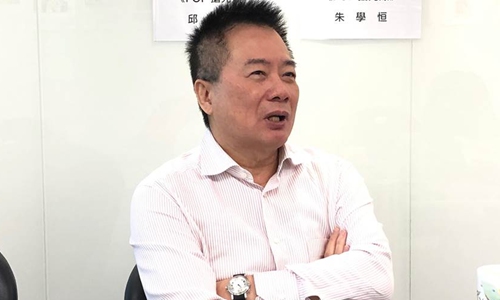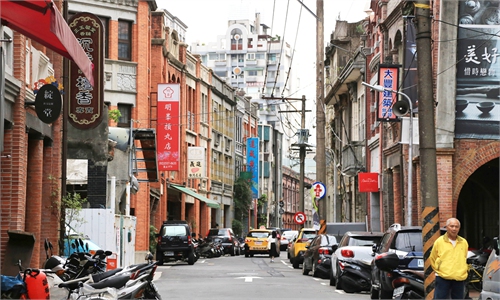US deeply involved in Taiwan Island's politics, peaceful reunification unlikely: former KMT official

Photo: Tsai Cheng-Yuan
The US has deeply involved in the island of Taiwan's politics, and the possibility of a peaceful reunification is fading, the former deputy secretary-general of the Kuomintang (KMT) Tsai Cheng-Yuan said in an exclusive interview with the Global Times.
One month before the 2020 Taiwan regional leader election, the US Central Intelligence Agency (CIA) personnel had threatened some media bosses of the Blue Camp to change their stance, Tsai revealed.
While the US continues to provoke confrontation, the People's Liberation of Army (PLA) recently resumed a week-long military exercise on both sides of the Taiwan Straits, but Democratic Progressive Party (DPP) authorities in Taiwan seem not to realize the imminent danger. The DPP is deeply divided, he noted. "They always ask me, 'What will the mainland do?' or 'What should we do?'" Tsai said.
There is a huge divergence of opinion within the DPP, but none to the point of quarreling, said Tsai, adding "Many DPP members are waiting and observing other members action." .
Tsai told the Global Times that the US has deeply involved in Taiwan Island's political affairs.
"Many Taiwan businessmen have a US passport. Before the 2020 Taiwan regional leader election, the CIA contacted many media bosses of the Blue Camp, demanding them to follow US order. As a result, the Blue Camp media changed their stance in the last month," he said.
The CIA even approached KMT legislators one by one and asked them whether they are anti-US and pro-Communist Party of China, said Tsai, adding that legislators do not have US citizenship, but some of their children may be studying in the US.
According to a poll released by the Taiwanese Public Opinion Foundation on Thursday, 41 percent of respondents worry about a cross-straits war, and 58 percent do not.Former Taiwan leader Ma Ying-jeou believes that "the first battle (between the two sides) will be the last." Thirty-four percent of respondents echoed Ma's remarks and 58 percent disagreed.
Tsai doesn't mince words about his pessimism, arguing that the possibility of a peaceful reunification is diminishing, no matter from the perspective of history, US intervention, de-sinicization and other factors.
In his opinion, Trump wants to win more votes by provoking the Chinese mainland, and to persuade voters forget the inefficiency of his administration.
"In 1996, missiles were fired (by the mainland) to places very close to Keelung and Kaohsiung," he said. "However, the locations of the (PLA's) military exercises are relatively far away from Taiwan Island with a relatively restrained attitude this year."
Tsai agreed with Ma's recent remarks that "the first battle will be the last."
If the Chinese mainland decides to deal with the Taiwan question with the armed forces, it will resolve it quickly, Tsai said.
"Because it would be like the Chinese mainland showing all the achievements of its military build-up in the past decades in front of the people, and the PLA would not allow the failure of a first battle," he added.

